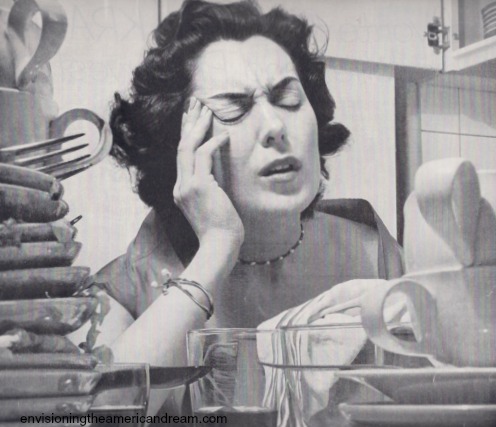Mr. Squish and I are in the process of a profound decluttering of our living space. We’re following the guidelines from The Life-Changing Magic of Tidying Up: The Japanese Art of Decluttering and Organizing. The book is simple, non-judgmental, and the process has been effective thus far. One of my main hopes after finishing this endeavor is that I will no longer be anxious about having people over.
I have a tendency, despite my best efforts, to hold onto stuff. I don’t love stuff, but I hate sending things to a landfill or re-purchasing items. (That raggedy, old shirt did an admirable job of hiding my torso. Why would I buy another one just because I “liked it.”) The stuff piles up until there’s nowhere to hide it. I have to use a lot more effort to clean because I’m shuffling all the stuff around, which ultimately means I don’t clean as often as I feel is necessary.
I’m not living in a dump or anything. My apartment is a very far cry from those who have problems with hoarding. I have a reasonable base-level of cleanliness. I want it to get better, but it’s reasonable. However, the mess is enough to make me anxious when people come over.
This is what I want people to see when they come over – even if they’re family, even if they’re close friends, even if they’re totally non-judgmental and just take the clutter in stride.

I usually end up cleaning frantically before I have company and then, in an amped up state from rushing around, apologize for the mess with unnecessary intensity. I’m sure it makes people uncomfortable. They’re all, “Hey! What’s up? I brought back that book you loaned me,” and I’m all, “I’M SORRY I’M A FILTHY MONSTER!”
I grew up in a more affluent neighborhood, where fewer people wore hand-me-downs and families would often have cleaning ladies. This was not the case for my family. I’m not saying either way is better, but as a kid, I noticed that I was different, but couldn’t put a finger on why. It took me a long time to realize that wealth shows up in many small ways – the way some of my friends never had dirty rags drying in view; the way they never wore the same outfit twice in a week; the bright, spacious cleanliness of their homes. I’m not saying we were hard off; I had braces and vacations and music lessons. I played the oboe for years and that is a beautiful, money pit of an instrument.

What I’m saying is there was a sense of cultural difference. My community growing up favored a more manicured home appearance, which requires the funds and non-Great Depression habits to pull off. (Great Depression habit example: This is a perfectly good, empty coffee can. I will keep it. Just in case.)
It wasn’t until college until I heard the term “white trash” used with seriousness in a conversation, but it didn’t take long at all to pick up the meaning. The image conjured is of slovenly, laziness both physically and morally – loose women with dirty hair and overflowing garbage cans outside trailer homes. The dire warning that if cleanliness is next to godliness, then dirtiness makes you trash. A dirty home supposedly says something about who you are as a person, especially if you’re a woman. (The implication of “white” being added to “trash” is not lost on me. It’s a gross term all around for describing people. It’s derogatory to the poor and has weird, racist undertones even if it only refers to whites.)
I am often anxious that someone will deem me “gross” and that anxiety has been reinforced through everyday occurrences: a co-worker saying she didn’t want to eat someone’s homemade food because that person was “dirty,” a family member telling me to use a disposable plate instead of china at another family member’s place because he was “dirty,” the way certain kids at school were made fun of for not showering everyday. These are actions that happened around me, not to me, but the societal check is still there. The message is clear: You better not be like that. You better display to the people around you that you are immaculately clean or else common bonding actions like sharing food, clothes, or hugs will be shunned.
This is a crappy message that puts a lot of pressure on people, myself included, to try and display self-worth through cleanliness with the idea that things like affection and friendship can be withdrawn based on results. It’s something I’m obviously still struggling with.
I don’t normally believe that the best way to resolve anxiety is to try and conform with the anxiety inducing guidelines. If I did that, my apartment could never be clean enough. However, my current situation is a case of wanting to change my environment to better suit my needs with the added bonus of also cleaving more closely to societal expectations. In the end, if I change my environment so I’m always happy with its state of tidiness, I won’t need to go through my usual panic routine. Everyone will be happier, and my guests won’t need to say, “Uh, it’s fine. Don’t worry about.”
If you enjoy cleaning tips, here are some other sites that provide good cleaning advice in a way that I find palatable:
- The book’s so good I’m linking it twice: The Life-Changing Magic of Tidying Up: The Japanese Art of Decluttering and Organizing
- Good ol’ UfYH, specifically the article about “company ready“
- http://jezebel.com/tag/ask-a-clean-person
- If you need serious support for a serious problem: http://www.squalorsurvivors.com/overcoming/index.shtml
